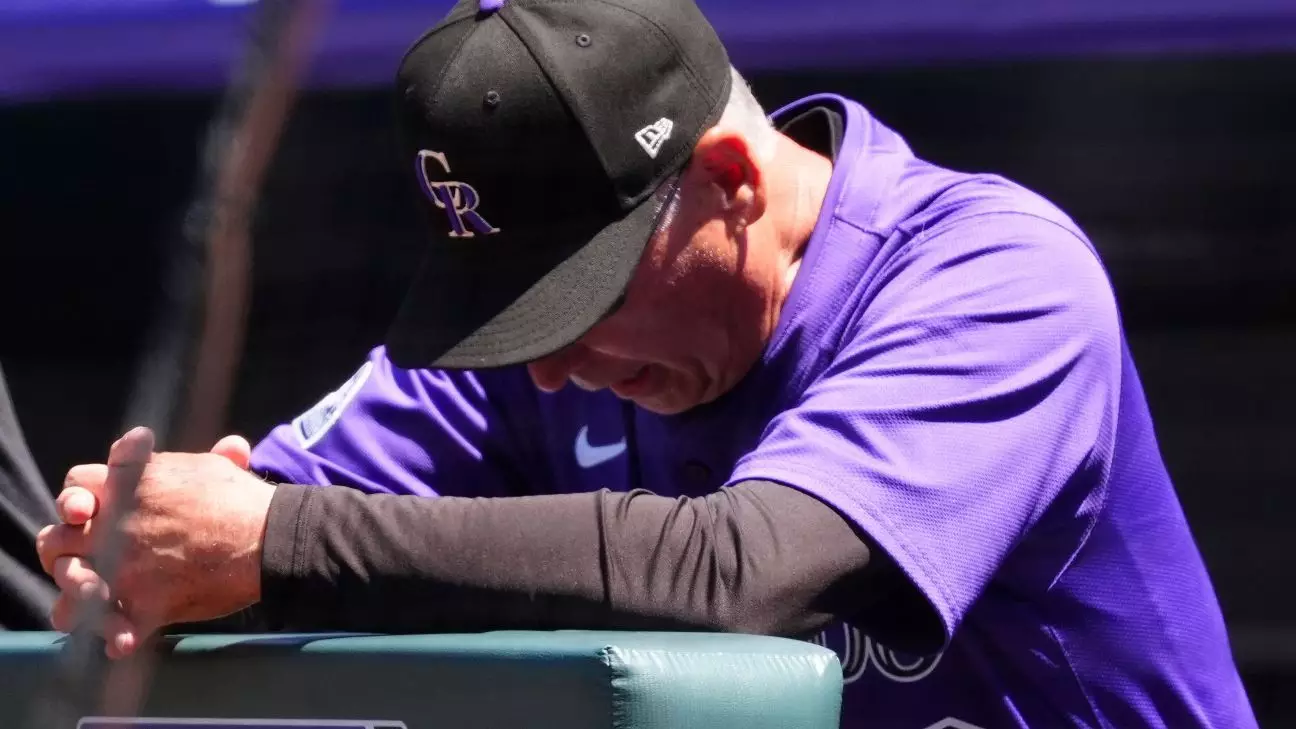The Colorado Rockies are steeped in turmoil as they grapple with an alarming start to the season, mirroring the spirals of past franchises that failed to overcome such existential crises. A staggering 7-33 record has led to the dismissal of manager Bud Black, who, despite having been the winningest skipper in franchise history, faced the inevitable consequences of performance that hasn’t matched the expectations. Following a humiliating loss of 21 runs to the San Diego Padres—an instance that should never be taken lightly in professional sports—it became clear that the pressure was too high to maintain the status quo. The Rockies have not only set themselves on course to rival historic losing records but have also sparked a critical internal reassessment that might just be overdue.
Ownership, led by Rockies owner Dick Monfort, carried the burden of responsibility and publicly acknowledged that the team’s performance has been unacceptable. Monfort’s statement highlighted a culture of accountability, emphasizing the need for renewal. His commitment to reevaluate every operational facet reflects a disturbing trend in sports when management realizes that things have drifted far from their original vision. For Rockies fans, this has been a painful revelation—watching a team that has struggled with consistency and competitiveness since their last postseason appearance in 2018.
A Band-Aid Solution or a True Reset?
In the wake of Black’s firing, the Rockies appointed Warren Schaeffer as interim manager. While the decision may be a reactive measure to quell fan dissatisfaction and shift the narrative, the underlying issues that have plagued the Rockies for years won’t disappear with a mere change of leadership. Schaeffer, who has been with the organization since the minor league levels, may bring familiarity, but is he genuinely equipped to serve as the catalyst for recovery? This move leaves many speculating whether the Rockies are simply applying a band-aid or if they are genuinely interested in a complete overhaul.
Hitting coach Clint Hurdle stepping in as interim bench coach adds a layer of complexity to the internal dynamics. Hurdle, a former Rockies manager himself, brings a wealth of experience, yet the team needs more than just a rebooted synergy in the dugout. The fundamentals of Rockies baseball must be reevaluated from the ground up—are the young players truly being developed? Are the strategies on the field evolving and adapting to today’s competition and analytics-driven approaches to the game?
The Challenge Ahead
As the Rockies prepare to embark on a road trip against the Texas Rangers, the path forward seems fraught with obstacles. Even as they managed a victory that salvaged a game in the recent series against San Diego, the Rockies are left grappling with grim statistics. With the worst 40-game start since the fabled 1988 Baltimore Orioles, the question becomes whether they can genuinely turn a corner or if they are on a collision course with history. Outscored by a staggering 128 runs so far, the need for immediate improvements is apparent; otherwise, the franchise risks solidifying its place among teams that are best forgotten.
The voice of Rockies general manager Bill Schmidt rings with a note of guarded optimism, yet repeating mantras of “turning things around” are not enough to placate a frustrated fan base. Schmidt’s call for “growth” may echo the sentiments shared by the players, who seem to be working hard and bringing energy to the field. Still, there is a distinct contrast between hope and results, and ultimately, it is results that matter most.
The Bigger Picture: Finding a Sustainable Future
As the Rockies look ahead, the real question looms not just over their immediate challenges, but about their long-term vision. In the context of Major League Baseball, where trends shift quickly, and rosters evolve at an unprecedented pace, the Rockies must cultivate a strategy that aligns with their ambitions to become playoff contenders once more. This means investing in player development, scouting, and a long-term philosophy that bends towards success rather than momentary reprieves.
The franchise’s performance since 2023—a measly .353 winning percentage—indicates an undeniable need. It’s a signal that perhaps a cultural reset could lead to a dramatic transformation within the organization. Rockies fans deserve a commitment to not only field a competitive team but to also restore hope and pride in a franchise that has the potential for greatness, should they take the necessary steps towards reaffirming their identity in the baseball landscape.


Leave a Reply